|
|
|
Sort Order |
|
|
|
Items / Page
|
|
|
|
|
|
|
| Srl | Item |
| 1 |
ID:
092497
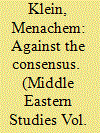

|
|
|
|
|
| Publication |
2009.
|
| Summary/Abstract |
Despite its dogmatic image, Hamas has a tradition of debate in its ranks. It is shown below through critical articles and manifestos composed in the years 1993-2007 by senior members of the movement. The common denominator among all these documents is their critique of the consensus in Hamas. Oriented pragmatically rather than theologically, the writers cover Hamas' most important issues and are diverse in their styles and structures. By analyzing these documents we can peer into Hamas' 'political-ideological kitchen'.
|
|
|
|
|
|
|
|
|
|
|
|
|
|
|
|
| 2 |
ID:
092499
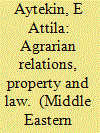

|
|
|
|
|
| Publication |
2009.
|
| Summary/Abstract |
Contrary to the prevalent tendencies of 'state-centrism' and legal formalism in the literature, this article studies the Ottoman Land Code of 1858 not as an initiator of trends but as a product of social change. The Code recognized private property on land, enlarged liberties of landholders, and pushed inheritance rules further towards gender equality. Deeply influenced by the uneven development of the capitalist relations of production, agrarian conflict, and the complex matrix of the interests of ruling groups, Ottoman land law in the nineteenth century unmistakably evolved in the direction of modern law based on the abstract individual and full commodification of land.
|
|
|
|
|
|
|
|
|
|
|
|
|
|
|
|
| 3 |
ID:
092503
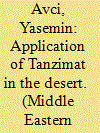

|
|
|
|
|
| Publication |
2009.
|
| Summary/Abstract |
The second half of the nineteenth century was a period when the Ottoman government's centralization efforts gained momentum. In Southern Palestine, this entailed a struggle for central government to gain the upper hand over the Bedouin tribes. In the 1860s, the Ottoman government was still using military power to end the internal strife between the Bedouin tribes. However, from the 1890s on, the government began to use sophisticated means and tactics in order to secure control and encourage the integration of the Bedouin element in the empire. The creation of a new town, namely Beersheba, the changing apparatus of administration, the construction of public buildings in desert, all meant that the government attempted to penetrate the nomad's way of life. In this study the main emphasis will be given to describing the role of the state in forming and changing the tribal institutions.
|
|
|
|
|
|
|
|
|
|
|
|
|
|
|
|
| 4 |
ID:
092495


|
|
|
|
|
| Publication |
2009.
|
| Summary/Abstract |
The definition of Turkish nationhood after the founding of the Republic has been evaluated and labelled very differently by various scholars. The classical view paralleled the official representation of Republican policies in describing Turkish nationhood as being based on a civic and territorial understanding of nationality. More recent and much more critical scholarship, which enjoys a near-hegemonic position in the study of Turkish nationalism today, claims that the official definition of Turkish nationhood has a clearly identifiable mono-ethnic orientation, manifest in a series of policies and institutions. This article argues that the definition of Turkish nationhood as manifest in state policies is neither territorial nor mono-ethnic, but rather ironically for the adamantly secular Turkish republic, the definition of Turkish nationhood is mono-religious and anti-ethnic, in striking continuity with the Islamic millet under the Ottoman Empire. The reason critical scholars perceive Turkish nationhood as mono-ethnic might stem from the dichotomous view of nationalisms as civic versus ethnic, a dichotomy that has recently been repudiated by some of its erstwhile proponents. Supremacy of the religious over ethnic categories in Turkey, as a historical legacy of the Ottoman millet system, might be applicable to most post-Ottoman states in the Islamic Middle East and North Africa, in contrast to the interplay of ethnicity and religion in Western Europe. This view of Turkish nationhood is confirmed by a dozen interviews that the author conducted with members of the political and intellectual elite of different ideological orientations in Turkey. It is then demonstrated how the new efforts at reformulating modern Turkish identity with reference to Ottoman and Islamic conceptions lead to new inclusion-exclusion dynamics with the Kurds and the Alevis, suggesting that a truly inclusive reformulation has to follow secular and territorial principles.
|
|
|
|
|
|
|
|
|
|
|
|
|
|
|
|
| 5 |
ID:
092498
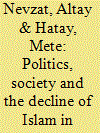

|
|
|
|
|
| Publication |
2009.
|
| Summary/Abstract |
The definition of Turkish nationhood after the founding of the Republic has been evaluated and labelled very differently by various scholars. The classical view paralleled the official representation of Republican policies in describing Turkish nationhood as being based on a civic and territorial understanding of nationality. More recent and much more critical scholarship, which enjoys a near-hegemonic position in the study of Turkish nationalism today, claims that the official definition of Turkish nationhood has a clearly identifiable mono-ethnic orientation, manifest in a series of policies and institutions. This article argues that the definition of Turkish nationhood as manifest in state policies is neither territorial nor mono-ethnic, but rather ironically for the adamantly secular Turkish republic, the definition of Turkish nationhood is mono-religious and anti-ethnic, in striking continuity with the Islamic millet under the Ottoman Empire. The reason critical scholars perceive Turkish nationhood as mono-ethnic might stem from the dichotomous view of nationalisms as civic versus ethnic, a dichotomy that has recently been repudiated by some of its erstwhile proponents. Supremacy of the religious over ethnic categories in Turkey, as a historical legacy of the Ottoman millet system, might be applicable to most post-Ottoman states in the Islamic Middle East and North Africa, in contrast to the interplay of ethnicity and religion in Western Europe. This view of Turkish nationhood is confirmed by a dozen interviews that the author conducted with members of the political and intellectual elite of different ideological orientations in Turkey. It is then demonstrated how the new efforts at reformulating modern Turkish identity with reference to Ottoman and Islamic conceptions lead to new inclusion-exclusion dynamics with the Kurds and the Alevis, suggesting that a truly inclusive reformulation has to follow secular and territorial principles.
|
|
|
|
|
|
|
|
|
|
|
|
|
|
|
|
| 6 |
ID:
092501


|
|
|
|
|
| Publication |
2009.
|
| Summary/Abstract |
Historically, the closure of a party is a common phenomenon in Turkish politics. While the recent case against the governing Justice and Development Party (Adalet ve Kalkinma Partisi, AKP) was reminiscent of this trend, the decision of the Constitutional Court demonstrated that there are changes in the dynamics of the Turkish political structure. Although the literature cites the so-called '28 February Process', the impact of EU accession, and the learning effects of democratization as explanations for the distinction of the AKP from its predecessors, this article argues that the AKP is different due to its extended business network and newly defined conservative base. The decision of the court in the recent closure case against the AKP reflects this structural political change within the foundation of Islamic parties in Turkey. While the court acknowledged the political legitimacy of the party by taking a decision against its closure, it has revealed the general discontent regarding AKP's non-adjusted conservative/pro-Islamic policies by cutting down its financial means.
|
|
|
|
|
|
|
|
|
|
|
|
|
|
|
|
| 7 |
ID:
092505


|
|
|
|
|
| Publication |
2009.
|
| Summary/Abstract |
Russia and OPEC are major oil producers. Considering the growing energy demand for the global economy, both parties are consistently increasing their exports of hydrocarbons and developing new supply capacities. Meanwhile, both parties have a mutual interest in creating a stable market by cooperating. However, the likelihood of Russian cooperation with OPEC is largely a function of oil prices and the political relations between Russia and OPEC countries. The following article deals with the relations between Russia and OPEC since the collapse of the USSR to the economic crisis in 2008. The author examines the political, cultural and economic conflicts between the two parties and their different attitudes toward the oil market in order to assess their chance to fully cooperate in the long term.
|
|
|
|
|
|
|
|
|
|
|
|
|
|
|
|
| 8 |
ID:
092494
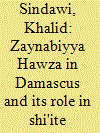

|
|
|
|
|
| Publication |
2009.
|
| Summary/Abstract |
The purpose of the present article is to examine the system of Shi'ite religious instruction in the Zaynabiyya awza in Damascus. As background we discuss the historical development which brought about the establishment of Shi'ite awzas and the evolution of Shi'ism in Syria. We analyze the reasons for the founding of the Zaynabiyya awza in Damascus, the causes of its great success, conditions for acceptance to the awza, the number of students, classrooms, teaching methods, the schedule, the language of instruction, official vacations and breaks, sources of financial support, stages of instruction and the curriculum of each stage, projects associated with the awza, the administrative building, the services it provides for its students, the awza's prospects for the future, its political role, and the Zaynabiyya awza's distinctive features in comparison to other Shi'ite institutions of the same kind.
|
|
|
|
|
|
|
|
|
|
|
|
|
|
|
|
|
|
|
|
|